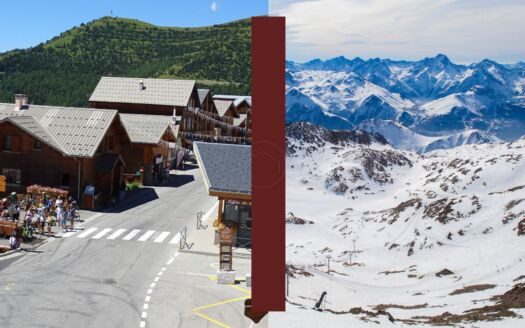20% VAT savings on new ski properties in the French Alps
How can you claim back the 20% VAT on your French new-build ski property? Purchasing a new-build ski property in the French Alps, presents a unique financial advantage: the opportunity to save 20% on the purchase price through a VAT (Value Added Tax) refund. This guide explains the process, requirements, and benefits in detail, using practical examples to illustrate key points.
Mountain Resort VAT Recovery:
- For second homes under the VEFA scheme, a 20% VAT rate applies.
- VAT recovery available if property is rented out for at least 20 years.
- Prorated VAT repayment for early resale.
- Rental management companies can assist with compliance and VAT return processes.
Understanding the VAT Refund Opportunity
When you buy a new-build ski property in the French Alps, you typically pay the full purchase price inclusive of VAT. However, the French Tax Administration offers a refund of this VAT, a significant saving that can amount to 20% of the purchase price. The process can be streamlined with the assistance of a French accountant, who can help in completing the necessary VAT rebate forms and liaising with the tax authorities.
Criteria for French VAT Refund
Eligibility for VAT Reclaim:
- Applies to properties offered for sale off-plan, newly built or less than five years old sold via a professional agent, or resold by an owner who has reclaimed VAT. It used to be only “French leaseback” properties that could provide the VAT advantage but not anymore. French leasebacks were typically located in holiday complexes with Spa and pool (residence de tourisme in French) and only allowed you a few weeks of personal use each year during the 20-year VAT period.
- A 20-year rental commitment is required, with proportional VAT repayment if not met.
The refund is contingent upon renting out the property through a management company under specific conditions. Firstly, the property must be furnished. Secondly, the rental terms must be short-term; you cannot, for instance, lease your apartment for an entire winter season. Finally, you must offer at least three para-hotel services, including reception (such as key handover), provision of bed and house linen, cleaning, and breakfast delivery (in the form of baguettes/croissants).
Management Company and Contractual Obligations
A management company plays a vital role in this arrangement. They not only handle the rental of your property but also ensure that the required para-hotel services are provided. When signing a contract with them, it’s crucial to ensure flexibility for personal use of your ski property, clearly defined management costs, and terms of rental income. A typical agreement will allow you to use the property yourself, provided you notify the company in advance, particularly during peak seasons like winter. We usually find that with most rental management companies, the ski property needs to be available for rental a minimum of 8 weeks a year, including some high-season weeks. You cannot keep Christmas, New Year, Feb school holidays and first two weeks of August and expect the rental management company to be happy about it! So, to recap, if you want to spend Christmas or the New Year, one week during the February half term, you will be fine. You also have all the other weeks of the year in Jan, Mar, Apr, the summer months and the rest of the year.
The 20-Year Rental Period and Its Implications
The 20-Year Rental Commitment:
- The VAT rebate assumes a 20-year rental period (100% accounting amortisation of VAT in France is over 20 years).
- Option to stop renting after 5 years, but it may require repaying a portion of the VAT rebate. So on a 500,000€, a new-build ski property purchased for 500,000€, the portion of the VAT would be 100,000€ (20% of the price). If you decide to stop letting your property after 10 years, technically, the French administration could ask for 50% of the original 100,000€ VAT refunded to you (50,000€) as 10 years is equivalent to 50% of 20 years. Letting your ski property under the para-hotelier rental agreement usually means that a 5-year minimum period is required to keep the VAT rebate advantage.
The VAT rebate is based on the assumption that the property will be rented out for 20 years. However, there’s an option to cease renting after 10 years, albeit with a potential financial implication – repaying a portion of the VAT rebate.
Selling Your Property
As the freehold owner, you can resell your property even within the 20-year period. The implications for the VAT rebate depend on the buyer’s intentions. If the new owner continues the rental activity under the same conditions, the rebate simply transfers to them without any need for repayment. However, if you sell the property after 10 years of rental activity and the new owner chooses not to continue renting it, you might have to repay half of the VAT rebate.
Read: The Property Market in Saint-Gervais-Les-Bains: A Gem in the French Alps
VAT Recovery Process
For non-French residents, the VAT reclaim process generally starts once a year, often in January, for purchases made the previous year. The expectation is that you will receive the VAT refund by June of each year, continuing until the entire VAT amount paid has been reclaimed (for new-build properties in France you pay the property price in stages according to the construction planning.
The “Para-Hotel” (para-hotelier) Regime in Detail
The para-hotel regime, crucial to this VAT recovery process, applies to furnished rentals where you provide at least 3 key services: breakfast provision (can be delivery), regular property cleaning, supply of bed linen and towels, and client reception (check-in). These services must not only be offered but actively provided, and their provision could be subject to verification by tax authorities. This regime requires more than just offering a furnished rental; it mandates a level of service comparable to a hotel, thus differentiating it from standard furnished rental taxation rules.
Tax Implications and Eligibility for VAT Reclaim
The transition to a para-hotel operator makes the property owner liable for VAT not only on the rental income but also on the income from the additional services provided. This entails more complex reporting and accounting requirements (Domosno recommends the services of an accounting firm to deal with it, usually around 300€/year). Eligibility for reclaiming VAT is specific: it applies to properties sold off-plan, newly built or less than five years old and sold through a professional agent, or resold by an owner who has previously reclaimed VAT.
Practical Example: VAT Recovery in Action
Consider a ski property bought off-plan for €850,000 excluding tax.
The VAT at 20% amounts to €170,000, which can be reclaimed at the time of acquisition or during the subsequent calls for funds. This example highlights the substantial financial benefit that can be realised through this scheme.
The Alpine Context: VAT Recovery in in the French Alps
In the context of the French Alps, this VAT recovery takes on added significance. When purchasing a second home under the VEFA (Vente en l’État Futur d’Achèvement) scheme, a 20% VAT rate is applicable on new homes or properties delivered less than 5 years ago. However, purchasers can benefit from VAT recovery if they commit to keeping and renting out the property for a period of not less than 20 years. This commitment ensures significant savings, and in the event of an early resale, the VAT to be repaid to the tax authorities is prorated based on the years the property was not held.
Read: The Romantic Side of the Alps: A Guide for Couples
Rental Management and VAT Recovery
For owners to reclaim the 20% VAT, evidence of the property being offered for rent, either directly or through a rental management company, is essential. Many owners opt for the services of professional hoteliers or rental management experts, to manage their property. These experts not only take care of operational aspects like key handover, cleaning, and laundry but also assist in fulfilling the requirements for VAT return completion.
At Domosno, we understand that navigating the complexities of VAT refunds and rental management for your French property investment can be daunting. That’s why we’re dedicated to guiding you in the right direction, particularly when it comes to finding a reputable accounting firm. Our extensive network and experience in the field allow us to connect you with trusted accounting professionals who specialize in French property tax laws. These experts are well-versed in the intricacies of the para-hotel regime and can provide invaluable assistance in ensuring that you maximize your investment while staying compliant with all regulatory requirements. With Domosno’s support, you can confidently embark on your property investment journey, knowing that you have the right expertise at your fingertips.
Investment Opportunities in the Alps
The allure of the French Alps for property investment is not limited to new developments. Resorts like Morzine, Val Thorens, and Saint-Gervais offer prime locations and top-of-the-range amenities. The integration of premium hotel services not only enhances the guest experience but also increases property visibility on booking platforms, thereby increasing the property’s value and rental income.
In conclusion, investing in a rental property in the French Alps can be financially rewarding. The opportunity to reclaim VAT under the para-hotel regime, coupled with the potential for capital appreciation, makes it an attractive option. However, it requires careful planning, understanding of the tax implications, and a commitment to meet the terms of the regime. With these in place, property investment in the French Alps can be a lucrative and enjoyable venture.
Please contact us at info@domosno.com as all tax-related topics can change.





